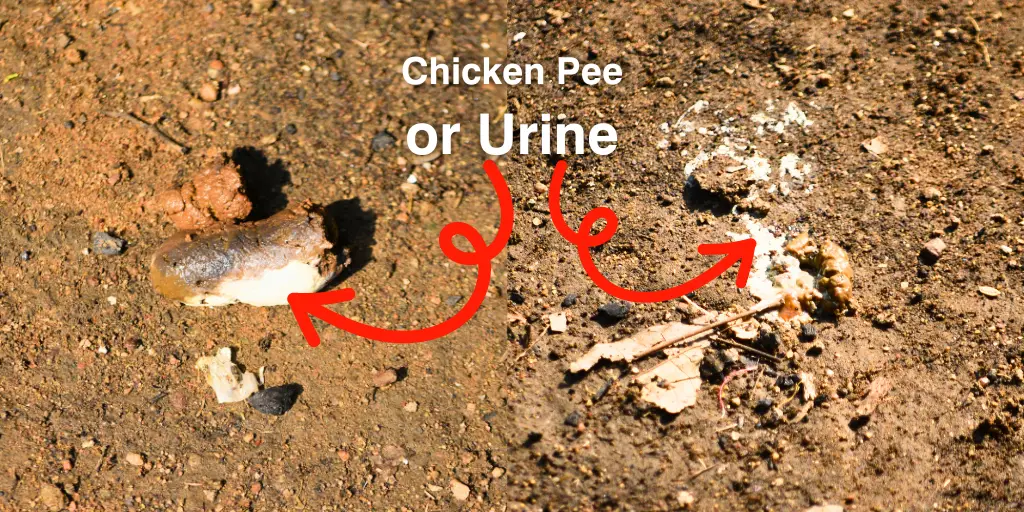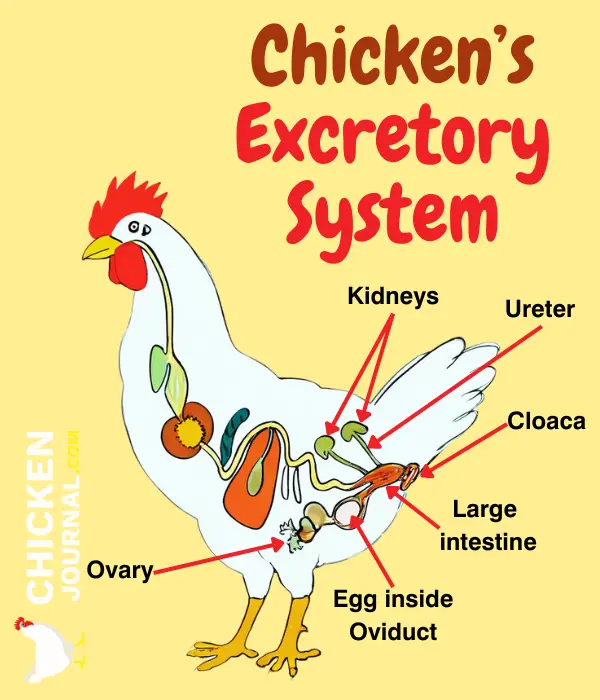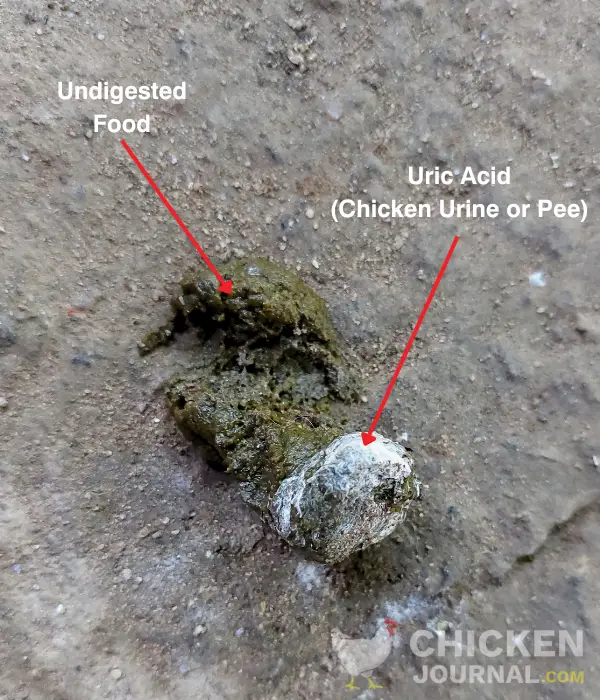
Many animals pee or urinate. So, every chicken farmer asks a common question: Do chickens pee or urinate?
When we talk about the animal kingdom, each species shows unique biological and physiological characteristics in their excretory system.
Chickens are one of the highest-raising domesticated backyard birds. So there are lots of misconceptions and FAQs about:
Do chickens pee?
Do chickens have a urinary system like other animals?
Unlike mammals, chickens and birds have a highly efficient water conservation and waste elimination system.
This adaptation is amazing and shows Earth’s diversity. Chicken urination and pee offer a fascinating introduction to poultry physiology.
It is essential to understand the chicken’s excretory system and its functions when raising chickens.
Chickens release semi-solid urine or pee, unlike mammals. This makes the topic more interesting when we raise questions like how chickens digest and expel waste from their bodies.
In this definitive guide, we will explain the chicken’s excretory system, including the excretory organs, their functions, and the excretion process.
Understanding Chicken Excretory System
Like humans, chickens’ excretory systems are essential for their health and well-being. The primary functions of the organs present in this system are to eliminate waste and maintain the proper fluid balance in the chicken’s body.

The chicken’s excretory system has many organs to remove waste. Here are the key parts and functions to know all about chicken pee:
1. Kidneys:
Kidneys are vital organs which filter blood and remove waste products. They regulate fluids, electrolyte levels in the body.
Just like humans, chicken kidneys have nephrons which are tiny in size helps in filtering blood, eliminating wastes. Kidneys are essential for health.
2. Ureters:
Chicken ureters are narrow tubes carrying urine or pee from kidneys to cloaca. Muscular contractions propel urine through ureters – a rhythmic, wave-like motion.
3. Cloaca:
The cloaca is a single opening of the digestive, urinary, and reproductive systems in chickens.
It’s a multi-function opening located at the posterior end of the body. It is the site where urine, feces, and eggs are expelled.
The large intestine is a major part of the chicken excretory process. It is about 4 inches long in a mature chicken.
The large intestine solidifies the undigested food inside it and absorbs all the water content. It also produces a few vitamins, which help break down complex carbohydrates through bacterial fermentation.
5. Role of the Liver:
The chicken’s liver is not directly connected with its excretory system but helps metabolize waste products.
It converts toxic substances into less harmful forms and produces bile, which is helpful for digestion and fat absorption.
6. Excretion of Nitrogenous Wastes:
Like other birds, chickens also excrete nitrogenous wastes such as uric acid in their poop. The uric acid is a highly concentrated chemical produced in the chicken’s kidneys, excreted through the cloaca.
Uric acid is a white, crystalline substance that is water-insoluble, allowing chickens to save water in an arid environment.
7. Regulation of Water Balance:
The excretory system of chickens works parallel to the respiratory and circulatory systems to regulate the body’s water balance.
The kidneys keep the amount of water needed for the body and excrete the extra water. These all work based on body hydration status.
8. Maintaining Acid-Base Balance:
The chicken’s excretory system also maintains the body’s acid-base balance. The kidneys regulate the hydrogen ions (H+) and bicarbonate ions (HCO3-) to maintain the blood’s pH within a narrow range.
So, the excretory system of chickens is a complex system like humans, which plays a vital role in their lives. However, the major difference is that this does not contain a urinary bladder.
Dysfunction of the excretory system can lead to the deposition of harmful substances in the body, consequently causing various diseases.
Do Chickens Have Urinary Bladders?
No, chickens do not have bladders. In mammals, the bladder stores urine before excretion. Chickens excrete urine or pee and solid waste as a single waste product in the cloaca.
Bird droppings have white and brown components, with the white part being uric acid or urine in mammals.
The Role of Chicken Kidneys in Waste Processing
Chicken kidneys filter and purify the blood, but they release uric acid instead of liquid urine, like mammalian kidneys.
This material is less poisonous and takes less water to flow out, which helps birds conserve water.
Kidneys efficiently filter water and concentrate waste, which is eliminated from the body by the cloaca during peeing.
Now, lets understand how chickens kidneys helps in chicken’s peeing.
Chicken Kidneys and Their Function
How Do Chicken Kidneys Work?
Chicken kidneys filter blood, eliminate waste, and regulate fluids and electrolytes using a complex mechanism. They filter blood with thousands of nephrons.
Chickens’ nephrons produce uric acid instead of urea, unlike mammals. This helps chickens concentrate their feces, minimizing their water needs.
Does Chicken Have Kidney Adaptations Specific to Birds?
Chicken kidneys can process and eliminate waste without a bladder, which is bird-specific. Adaptations include excreting uric acid, which is less water-soluble than urea, conserving water.
– Unique nephron arrangement combines reptilian and mammalian types, improving waste processing and water conservation.
-Their ability to manage electrolytes and acid-base balance is essential for flight and rapid metabolism.
These modifications demonstrate the chicken’s excretory system’s evolutionary cleverness and avian physiology’s distinctiveness. Moreover, understanding these systems helps explain how chickens and other birds have adapted to varied aquatic conditions.
The Mechanics of Chicken Peeing
Do Chickens Pee? The Myth Debunked
Yes, chickens pee or urinate. They have a highly efficient excretory system but do not have the same type of urinating mechanism. They do not excrete urine from their skin; it’s a myth.
Like humans, a chicken’s urinary system also contains kidneys and ureters but lacks a bladder that stores urine. So, chickens excrete uric acid (white to cream in color) in their feces as urine or pee in a semi-solid form.
Why Don’t Chicken Pee Like Mammals?
Chickens do not pee like mammals because their body does not make liquid urine. Instead, their kidneys filter blood and discharge nitrogenous wastes such as uric acid and feces through the cloaca, the single opening for the digestive, urinary, and reproductive systems.
Water conservation is crucial for many birds, and this excretion process is efficient. Compared to urea, animals’ principal nitrogenous waste, uric acid requires less excreting water. This indicates that vertebrates have adapted differently to waste and water management.
How Do Chickens Pee and Excrete Waste?

Explanation of Uric Acid Versus Urea in Waste Excretion
Uric acid and urea are the main differences in waste excretion between chickens and mammals.
Urea is soluble in water, which requires a lot of water during the excretion process as urine by mammals.
But chickens pee uric acid, which is less poisonous and less water-soluble, so they lose less water. Bird droppings are white because of uric acid.
How Do Chickens Urinate and What Does It Look Like?
The process of “urinating” in chickens is actually the excretion of uric acid, which is combined with the feces in the cloaca and discharged together.
This is because chickens do not urinate normally. This combination produces the typical droppings, which are made up of two parts: the uric acid (which is white or creamy) and the dark part (feces).
Depending on the food and health of the bird, consequently, chicken droppings might differ in substance and appearance.
Do Chickens Pee and Poop Out of the Same Hole?
Yes, like other birds, chickens have a single external hole called the cloaca, which has several purposes, such as allowing the excretion of nitrogenous waste (the urine or pee) and feces. Moreover, the hens lay eggs from the same opening.
The mammal’s excretion system is quite different because it has different openings for both digestive and urine waste. In chickens, the cloaca is a unique adaption that is all in one opening for excretion of poop, urine, and egg laying.
Frequently Asked Questions About Chickens Pee and Poo
Do Roosters Pee?
Yes, rooster and hen pee. They both have the same excretory system for peeing, but the hens have the additional bonus of laying eggs from the same cloaca.
Like hens, roosters pee from the cloaca, nitrogenous waste containing feces mixed with uric acid, which is white to cream in color.
Do Birds Pee and Poop at the Same Time?
In reality, stool and nitrogenous waste (uric acid) as pee are released by birds, including chickens, through the same opening known as the cloaca.
This combined excretion is effective because it reduces the bird’s body weight, which is essential for flight, and helps conserve water.
Chicken Behavior and Health
How Often Do Chickens Poop And Urinate?
Age, food, and overall health are some of the factors that can affect how frequently chickens poop. Chickens have an excretory capacity that ranges from several times per hour to every few hours on average.
The regularity and consistency of a chicken’s feces should be observed to keep an eye on its health and welfare.
What Does a Healthy Chicken’s Excretion Look Like?
Uric acid has a white or off-white pasty look in a healthy chicken poop, which is usually accompanied by a soft, brown fecal portion.
You may see different colors, textures, and consistency of the chicken poop if chickens eat various types of foods.
So, if the chicken-eating more green, it may lay dark greenish poop with a white uric acid layer.
Understanding Chicken Poo and Pee to Monitor Health
Examining the chicken poop and pee (feces) of a chicken is a valuable method of determining its overall health.
Frequency, consistency, or appearance changes in feces can be early warning signs of health issues.
For example, diarrhea may indicate an infection or an imbalance in the diet, and the excrement frequently contains worms or other parasites.
Frequent observation helps you to identify and manage possible health problems, thereby protecting the chicken’s wellbeing.
Chicken Excretion and Care
Hygiene and Habitat
Cleanliness and health are essential for chickens. Their living conditions affect their health, production, and excretion. Some best practices you must follow are:
- Clean the coop regularly and change the bedding to prevent waste buildup and sickness. Ventilation is also required to keep the air fresh and reduce ammonia from decomposing trash.
- Maintain proper ventilation in the chicken house to keep the air clean and fresh without producing drafts that could hurt the chickens.
- Give each chicken enough space to roam and explore to reduce stress and aggression. Overcrowded environments can spread disease and build up ammonia.
- Keep clean water available. Digestion and excretion require water, and filthy water can be harmful.
- Understanding chicken poop color and texture is most important. Knowing the usual look of chicken droppings can assist in discovering health issues early. Check the coop for atypical excretions, which may signal health issues.
Nutritional Impact on Chicken Pee and Poo
Chickens’ diets affect their defecation, including lowering frequency and appearance. Healthy chicken pee and well-being require a balanced diet.
- Feed various proteins, carbs, fats, vitamins, and minerals. The chicken’s age, breed, and purpose should determine its food.
- Sudden nutrition changes might disturb a chicken’s digestive tract, causing irregular output. Introduce new foods slowly to modify their system.
- Abnormal excretion, such as watery droppings or color changes, can suggest food imbalances or health concerns. Protein can cause dark droppings, whereas a shortage of nutrition might cause lighter, watery droppings.
What to Do If You Notice Abnormalities in Your Chicken’s Excretion?
When you see abnormalities and significant changes in your chicken’s poop, you need to do some easy things below.
1. Assess the Diet: Check the chicken’s diet for alterations or nutrient deficits. Consult a poultry nutritionist to verify the food covers all nutritional needs.
2. Environmental stressors: Stress and discomfort can affect gut health.
3. Consult a vet: Consult a veterinarian if food and environmental changes do not work or if lethargy, loss of appetite, or atypical droppings persist for over a few days. They examine health, recommend treatment, and advise on care.
Chicken care requires knowledge of food, excretion, and health. Therefore, chicken owners can prevent health risks in their flocks by monitoring and responding to irregular excrement.
Conclusion (Do Chickens Pee or Urinate?)
So, we can conclude that chickens can pee. Yes, the mechanism of excretion is different, but they pee in dry form, which differs from that of mammals.
We have also studied the anatomy and function of various organs in chickens’ excretory systems.
This knowledge helps every chicken farmer to know more about the chicken’s excretion process and health issues.
Another exciting thing about chicken peeing is that their excretory system contains no bladder and excretes uric acid as semi-solid urine or pee.
Chickens excrete uric acid and excrement through the cloaca instead of the bladder. This practical technology conserves water and reduces weight.
Chickens need a clean, healthy environment to stay healthy and avoid sickness. Cleanliness, airflow, and room are all essential when caring for chickens.
A balanced diet affects chicken health and excretion. Understanding the usual look of chicken droppings can assist in diagnosing health and dietary concerns.


Leave a Reply